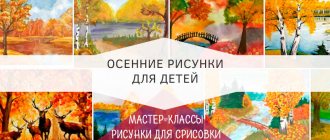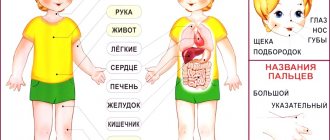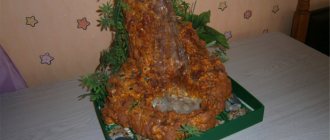The daily routine of a preschooler is difficult to overestimate. Children in kindergarten know that every day is subject to a routine: morning rituals will be followed by afternoon and evening rituals. Accustoming a child to a proper daily routine is an important task for adults.
To study the topic “Daily Routine,” teachers use visual teaching materials – pictures, posters. Pictures are necessary for classes and help not only to master the material of the lexical topic, but also to expand the vocabulary of children.
Already in the younger group, i.e. at 3-4 years old, children know the words “alarm clock”, “clock”, they use these words, correctly show a picture of an object, but still the concept of “time” will remain an incomprehensible unknown quantity for a long time. Children cannot yet clearly determine the time of day, although in their speech they use words that characterize morning, afternoon, evening, and night. Thematic pictures, in which the daily routine is outlined in combination with signs of the time of day, help preschoolers orient themselves, which in the future will allow them to quickly learn to plan their activities.
Basic Rules
As a rule, the baby associates morning, afternoon, evening, and night with the actions that he or the people around him perform at that time.
- So, in the morning he goes to kindergarten, and mom goes to work;
- During the day he has lunch and sleeps;
- in the evening his mother comes home from work and picks him up from kindergarten;
- at night he must sleep.
The child is not very interested in what is happening in nature at this time, and parents sometimes have no time to observe the full picture of each time of day. However, a child can and should be taught everything.
To do this, we offer you pictures called “Morning, afternoon, evening, night.” They can be taught in a variety of ways.
- Firstly, you can rely on Doman’s technique and show your child pictures for a few seconds, giving out loud the names of the time of day. Gradually, the baby will remember the picture and will distinguish morning, day, evening, night according to their signs in nature.
- Secondly, pictures called “Morning, afternoon, evening, night” can be hung in different parts of the room, and, approaching one of them, tell the child about the time of day.
- Thirdly, just select pictures and talk about them with your child: look at all the details, discuss them and comment on them. So, gradually the morning, day, evening, night for the child will be associated not only with everyday activities - the baby will learn to understand nature and see the beauty in it.
Pictures entitled “Morning, afternoon, evening, night” can be downloaded and printed from our website. Ideally, you will set aside strictly specific hours for studying them at the same time of day. So, you study the morning in the morning, comparing the picture in the picture with the view outside the window and finding similar characteristics. We do the same with other pictures. All signs of night can be observed in the evening in winter, when it is not too late and the baby is not sleeping.
Children's daily routine in pictures
In the didactic collection of materials Children's daily routine in pictures, we offer thematic images rich in colors. Interestingly designed drawings of household items, as well as illustrations of specific actions, will instantly attract the baby's attention.
Pictures can be downloaded and printed to organize the learning process. They allow the child to more easily adapt to kindergarten. Give preschoolers an idea of the optimal daily routine. They will easily teach you to follow all the rules of the routine.
A children's daily routine in pictures is also necessary for conducting classes to expand the vocabulary of children. In an accessible form, they are introduced not only to terms, but also to general concepts (time, order, day-night, etc.).
Most didactic pictures imitate real images from the lives of children.
Some presentations are designed in the form of frames from today's popular cartoons.
Discussing pictures with a child
After studying the pictures in detail, try to get a response from the child. You can conduct such classes with children 2-2.5 years old: they are quite capable of answering questions.
Ask your child to say:
- what happens in the sky at night,
- as the morning comes,
- why does it become light,
- why is it warmer during the day and colder in the evening, etc.
Such tasks are quite within the power of a child, if, of course, he has previously received all the necessary information from you. We only ask what we have taught ourselves!
And, of course, coloring books will be a useful step in learning. When studying pictures, pay attention to those colors and undertones that prevail in nature at certain times of the day. When offering your child a coloring book on this topic, ask them to display the primary colors of the morning, evening, and night. This is an excellent memory and imagination exercise.
Thus, the pictures offered on our website will help you develop your child, learn new concepts with him, and gain a deeper understanding of the nature around us.
Story pictures
Many presentations on the topic “Daily routine for children in pictures” use frames from cartoons, but experts are inclined to believe that it is better to take real images of children in the group for such a schedule. In the didactic game “Daily Mode Pictures for Children,” the child better learns the concepts of the time of day, so if the first step is a toy clock or a tablet with ready-made pictures, then the second step in studying this topic will be plot pictures, simple puzzles, activities where they will be used double cards.
The third step will be to draw scenes depicting the child’s specific actions while getting up after sleep, breakfast, a walk, etc. Filling out your own daily routine is much more fun than simply putting together a picture of your daily routine.
A selection of free materials
Black and white pictures
This manual is from the series Children's daily routine in pictures - breaking the mold. Black and white sketches give children the opportunity to fantasize and work independently, creating a unique picture of the routine.
You can offer coloring books to both children and primary school students. Armed with their knowledge of the daily routine and using their imagination, they will be very happy to do interesting things.
Such plot pictures are suitable for creating a didactic game. The task is to find a place for a hand-decorated card among others. Thus, the child needs to fill the gap in the correct routine.
Child's daily routine
Thematic lesson from the School of the Seven Dwarfs on the topic: Child’s daily routine.
Poster: Schoolchild's daily routine.
Preschooler's daily routine.
Preschooler's daily routine.
Schoolchild's daily routine in pictures
For primary school children, the children's daily routine in pictures is compiled based on their age characteristics.
A higher level of development of schoolchildren’s logical thinking and associative perception allows them to assimilate:
- whole stories;
- pattern of actions;
- clear time frames.
They can already be offered blanks for drawing. Partially completed pictures encourage the child to fill them out according to his own schedule.







